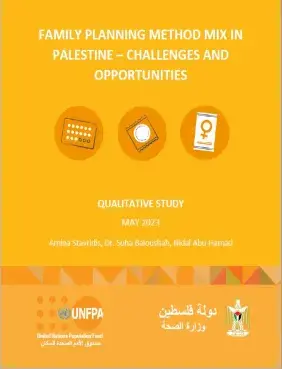This publication responds to the urgent need to reduce the stagnated unmet need for family planning and contraception utilization in Palestine. The study adopts a qualitative approach to exploring the knowledge, attitude, and perception of Palestinian women at reproductive age toward up-taking long-acting reversible contraceptives (Hormonal IUD, Medroxyprogesterone Acetate Injection I.P, and Implant) in addition to understanding the views and positions of health service providers and policy makers regarding the barriers and incentives for introducing long-acting reversible methods.
The study outlines key challenges that deter the use of these contraceptive methods such as beneficiaries' lack of contraception knowledge, the power dynamic within the family regarding family planning decision-making, supply chain shortages, and the high cost of the long-acting reversible methods. Additionally, healthcare providers’ lack of adequate training and lack of experience in providing counseling on this range of contraceptives has an impact on women's decision-making regarding family planning methods.
The study recommendations guide on interventions to improve the access and quality of family planning services in Palestine in order to combat the persistent unmet need for family planning and enhance positive sexual and reproductive health outcomes.


